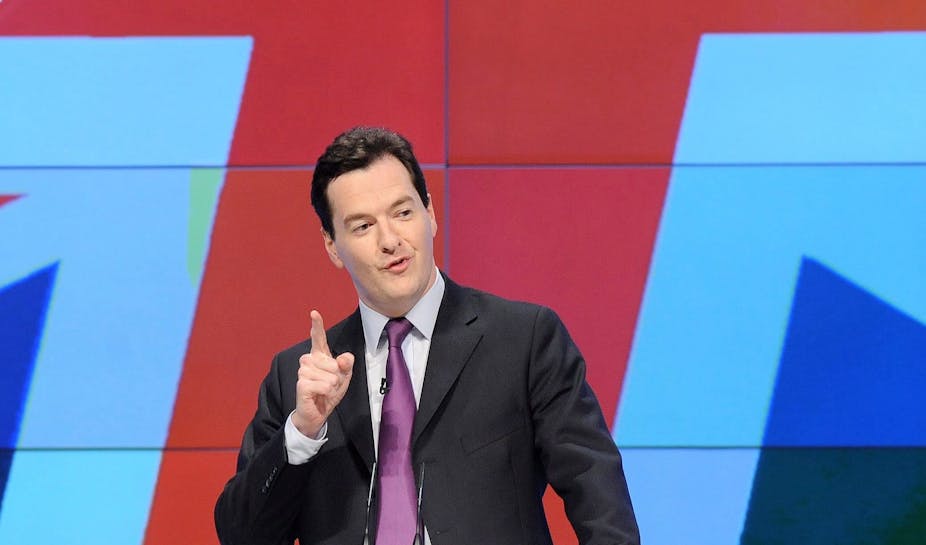The UK’s former AAA credit rating is no more. Moody, a tyrant of the credit rating system, decided that a downgrade was in order from AAA to AA1 for the first time since 1978. The pound fell in a state of mild panic (emphasis on mild) to its lowest in 16 months, and Chancellor George Osborne has dug in against accusations that his economic policy has been a shambles. “We have to convince the world that we can pay our way in the world,” he said.
A decidedly unconvincing stiff upper lip has come into play. For Osborne, the downgrades are different to those that took place regarding France and the United States. Terms of classification are being debated, much like the language of weather patterns. The UK was not been placed on “negative watch” but placed on “a stable outlook”. Not gale-force winds, merely a flutter over otherwise turbulent waters.
We need not necessarily embrace Osborne’s position to soberly assess the readjustment. The consequences are not necessarily going to be as dire as predicted. As Tim Worstall explains in Forbes, “the only real legal meaning of a credit rating refers to how much capital a bank has to allocate to a holding in a particularly asset.” That, Worstall points out, is not dependent on any one ratings agency, but more about a combination of ratings – a confirmation from, say, any of the other big guns such as Fitch or Standard & Poors.
The agencies are regarded by many financial boffins as reactive – they do not affect the market trends so much as follow them, though a very aggressive jury is out on that subject. For commentators such as Kevin Gallagher, the credit rating agencies were instrumental in creating the financial crisis, then retarding any subsequent recovery His reasoning is simple: these agencies provided the stamp of approval over toxic assets, hardly surprising considering that such agencies are paid by owners of assets that seek the ratings to begin with. This conflict of interest has never been resolved.
The detrimental judgments from such rating agencies have another downside – they are not easily challenged. A legal ring of protection has effectively been created around their assertions. Attempts to sue agencies never work – their acts have to be shown to be ones of “actual malice”. Disastrous financial outcomes are insufficient grounds.
British sovereign debt has been slated for the downgrade for some time now – Moody’s reaction is hardly a shock, though it again demonstrates the undesirably influential role such agencies have in the international financial system. If other ratings agencies get on board, the fiscal report card of the Cameroons will look a lot uglier.
Despite this ugliness, other telling features mark the UK as a different proposition from those of other ailing economies within the eurozone. Not all downgrades are the same. For one thing, having one’s own currency, as opposed to a common zone based currency has its advantages. Limping countries such as Portugal, Spain, Ireland and Greece can’t call on their own central banks to print more money to buy gilts, should the need arise. They are answerable to the whims and actions of the European Central Bank, which regulates the amount they can do so. While it can be undesirable on the part of the Bank of England to start the printing presses rolling, the option is there.
The outlook for the UK government, for all the softening touches Osborne has attempted to lay, is grim. It is he, accused members in the House of Commons, who has been “downgraded”. Shadow Chancellor Ed Balls observed Osborne “used to say a downgrade would be a disaster, today he says this downgrade doesn’t matter – but he is still warning a further downgrade really would be a disaster”.
Here we have the satirical Yes Minister lingo writ large across British financial policy – a downgrade that is significant until it happens, only to be deemed inconsequential till the next one happens.
Such logic is perfect in the nonsense of financial gloom that is afflicting Europe. The election stalemate in Italy – a country that risks its first hung parliament in post-war history - is yet another footnote nay imprint on the potted road of European recovery.
European responses are, as ever divided, and will continue being divided. The austerity clans formed around the UK, northern Europe and Germany are pitted against the pro-growth brigades fronted by France.
It is impossible to see any reconciliation of these positions – to grow, one has to have something to grow from. And the Cameroons have so far failed to show that austerity actually works.

